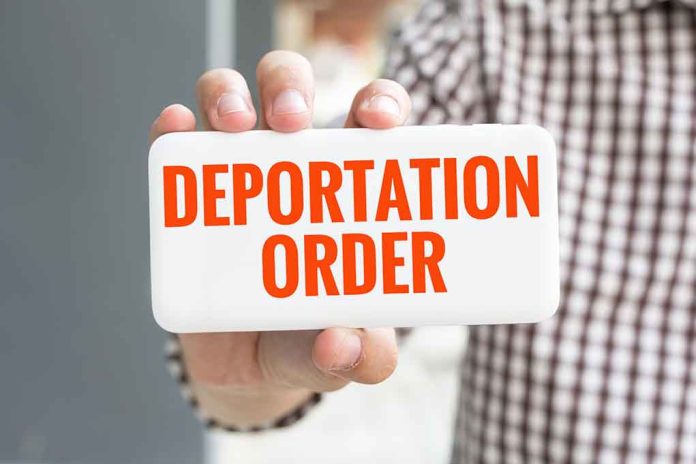
The Trump administration has launched a 60-day self-deportation policy offering undocumented immigrants a chance to leave voluntarily and potentially return legally, while those who stay could face criminal penalties and permanent exclusion from the United States.
Key Takeaways
- Undocumented immigrants have approximately 60 days to self-deport or face significant consequences, including potential criminal prosecution and permanent bar from legal reentry.
- The administration is implementing a registration requirement for unauthorized immigrants over age 13 who have been in the U.S. for more than 30 days.
- Those who self-deport may be eligible to return legally, especially farm and hospitality workers vouched for by employers.
- Homeland Security reports over 5,000 voluntary departures in the past month through the CBP Home application.
- The policy does not apply to legal permanent residents, those with visas, work permits, or in immigration court proceedings.
New Registration Requirements and Enforcement
The Trump administration is implementing strict new measures targeting undocumented immigrants, including a mandatory registration system. Those over age 13 who have been in the United States illegally for more than 30 days without registering with the federal government may face criminal penalties, including potential jail time and fines. Parents or legal guardians must register on behalf of teenagers subject to these requirements, and those who register will receive a document they are required to carry at all times.
“President Trump and Secretary Noem have a clear message for those in our country illegally: leave now. If you leave now, you may have the opportunity to return and enjoy our freedom and live the American dream,” said Homeland Security spokeswoman Tricia McLaughlin.
The administration has clarified that certain groups are exempt from these requirements, including legal permanent residents, immigrants under parole, those with visas (even if overstayed), and individuals with government work permits or in immigration court proceedings. The policy is based on a World War II-era law that was initially designed to identify suspected communists, now repurposed for immigration enforcement.
Self-Deportation Initiative and Potential Legal Return
President Trump has outlined a 60-day self-deportation period for undocumented immigrants, emphasizing that those who leave voluntarily may have the opportunity to return legally. This approach specifically addresses concerns about labor shortages in industries heavily reliant on immigrant workers, such as agriculture and hospitality. According to Homeland Security Secretary Kristi Noem, the administration has already seen significant results through their self-deportation efforts.
The president has particularly highlighted the need to accommodate farmers and hotel operators who rely on undocumented labor. Under the proposed system, employers could vouch for valuable workers, potentially allowing them to return through improved legal pathways.
“So a farmer will come in with a letter concerning certain people, saying they’re great, they’re working hard. We’re going to slow it down a little bit for them, and then we’re going to ultimately bring them back. They’ll go out. They’re going to come back as legal workers,” said President Trump.
Illegal aliens should use the CBP Home app to self-deport and LEAVE the country now. If they don’t, they will face the consequences. pic.twitter.com/5XmNgGyEk2
— Homeland Security (@DHSgov) April 10, 2025
Support Programs and Industry Impact
The administration is developing support programs for deported immigrants in their home countries, offering assistance with food, housing, and other necessities. This approach aims to make voluntary departure more palatable while addressing humanitarian concerns. Secretary Noem has emphasized that these support mechanisms are crucial to the success of the self-deportation initiative, as they provide a safety net for those returning to potentially challenging circumstances.
Industries heavily dependent on immigrant labor are already expressing concerns about potential workforce shortages. The pandemic highlighted the essential role many undocumented workers play in America’s food supply chain and hospitality sector. Organizations like the American Business Immigration Coalition are advocating for improved work permit systems, noting that existing programs such as H-2A and H-2B are often difficult for employers to navigate. The administration has indicated openness to reforming these programs to better serve business needs while maintaining immigration enforcement priorities.









